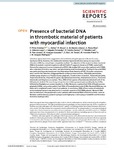Presence of Bacterial DNA in Thrombotic Material of Patients with Myocardial Infarction

Use this link to cite
http://hdl.handle.net/2183/26506
Except where otherwise noted, this item's license is described as Atribución 4.0 Internacional (CC BY 4.0)
Collections
- Investigación (FEP) [507]
Metadata
Show full item recordTitle
Presence of Bacterial DNA in Thrombotic Material of Patients with Myocardial InfarctionAuthor(s)
Date
2020-10-01Citation
Piñon-Esteban, P., Núñez, L., Moure, R. et al. Presence of bacterial DNA in thrombotic material of patients with myocardial infarction. Sci Rep 10, 16299 (2020). https://doi.org/10.1038/s41598-020-73011-5
Abstract
[Abstract] Infectious agents have been suggested to be involved in etiopathogenesis of Acute Coronary Syndrome (ACS). However, the relationship between bacterial infection and acute myocardial infarction (AMI) has not yet been completely clarified. The objective of this study is to detect bacterial DNA in thrombotic material of patients with ACS with ST-segment elevation (STEMI) treated with Primary Percutaneous Coronary Intervention (PPCI). We studied 109 consecutive patients with STEMI, who underwent thrombus aspiration and arterial peripheral blood sampling. Testing for bacterial DNA was performed by probe-based real-time Polymerase Chain Reaction (PCR). 12 probes and primers were used for the detection of Aggregatibacter actinomycetemcomitans, Chlamydia pneumoniae, viridans group streptococci, Porphyromonas gingivalis, Fusobacterium nucleatum, Tannarella forsythia, Treponema denticola, Helycobacter pylori, Mycoplasma pneumoniae, Staphylococus aureus, Prevotella intermedia and Streptococcus mutans. Thus, DNA of four species of bacteria was detected in 10 of the 109 patients studied. The most frequent species was viridans group streptococci (6 patients, 5.5%), followed by Staphylococus aureus (2 patients, 1.8%). Moreover, a patient had DNA of Porphyromonas gingivalis (0.9%); and another patient had DNA of Prevotella intermedia (0.9%). Bacterial DNA was not detected in peripheral blood of any of our patients. In conclusion, DNA of four species of endodontic and periodontal bacteria was detected in thrombotic material of 10 STEMI patients. Bacterial DNA was not detected in the peripheral blood of patients with bacterial DNA in their thrombotic material. Bacteria could be latently present in plaques and might play a role in plaque instability and thrombus formation leading to ACS.
Keywords
Acute coronary syndrome
Bacterial infection
Acute myocardial infarction
Bacterial DNA
Bacterial infection
Acute myocardial infarction
Bacterial DNA
Editor version
Rights
Atribución 4.0 Internacional (CC BY 4.0)
ISSN
2045-2322






